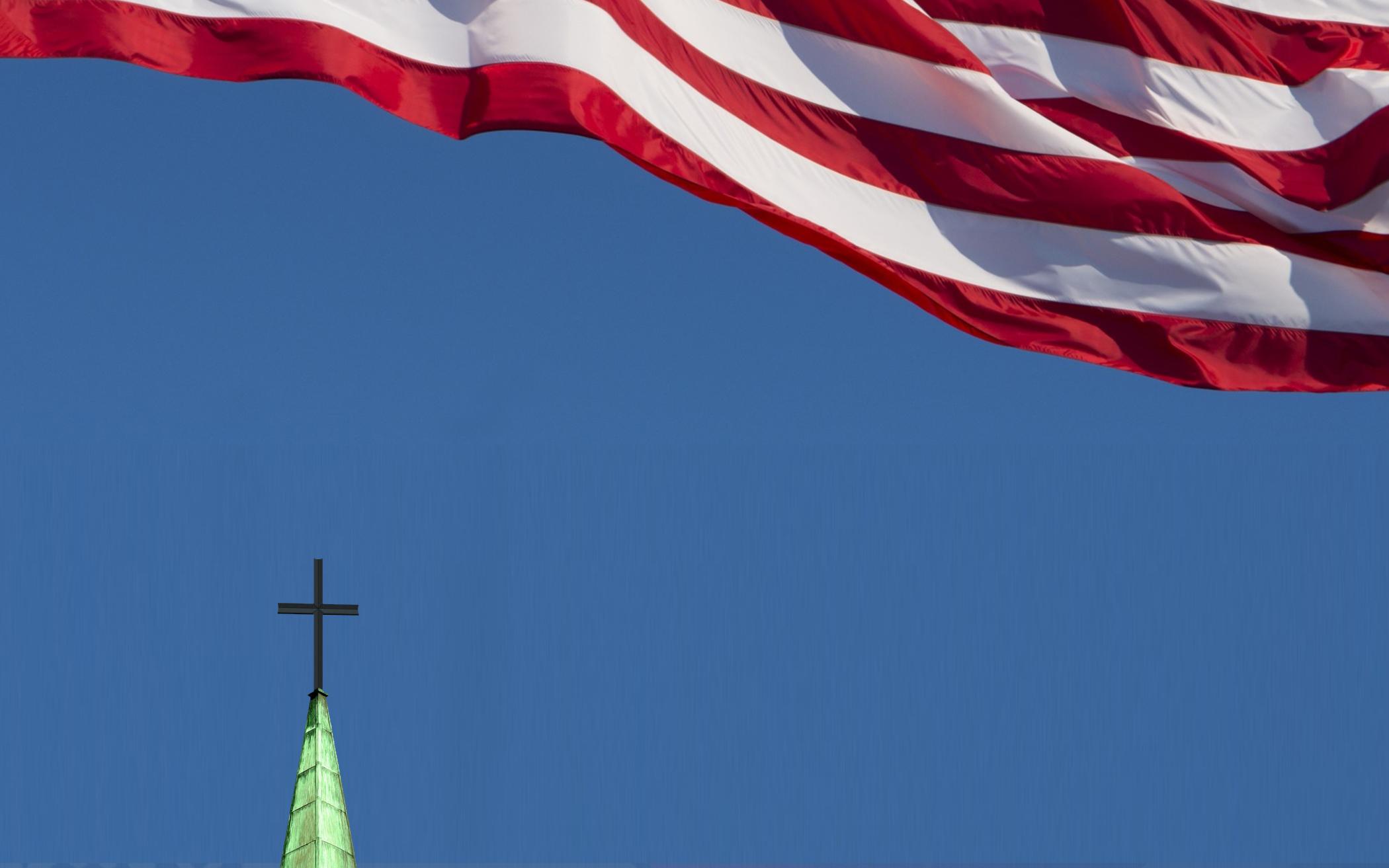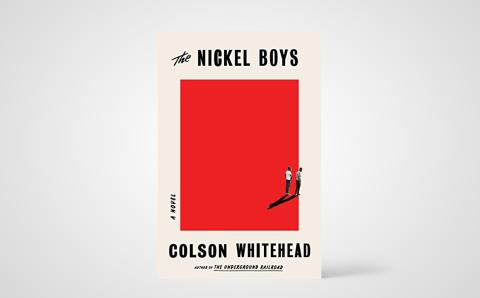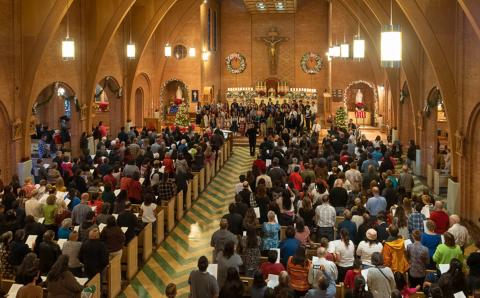“Idols” are not necessarily bad all the way down. Many, in fact, are good things that have gotten out of place, which we have inflated to take a place above or next to the Creator.
The Old Testament is very hard on idolatry, and so have Reformed Christians over the centuries. Heidelberg Catechism Q&A 94 interprets the first commandment (that we shall have no other gods before God) to mean that we “avoid and shun all idolatry” at the risk of our very salvation. And what is idolatry? “Having or inventing something in which one trusts in place of or alongside of the only true God” (Q&A 95).
The first generation of Reformed people sometimes turned this mandate to destructive violence in smashing the statuary and stained-glass images in Roman Catholic churches. We ourselves have become better aware (even if our walk doesn’t always match our talk) of how money, sex, or “success” can function as idols in our lives. But one of the great challenges in the matter is that “idols” are not necessarily bad all the way down. Many, in fact, are good things that have gotten out of place, created things that we have inflated to take a place above or next to the Creator.
Family is one of those good things. At best it is something dear and precious, and the site of our most pressing duties. But contrary to a common mantra, family should not be the most important thing in our lives; that should be God. Nor should it mark the full range of our love and concern; that is to be our neighbor as defined by Jesus’ story of the Good Samaritan.
The Danger of Civil Religion
Loyalty to country can offer the same temptation. At their best, nations provide their citizens with rights and protections, so we in turn have certain obligations as citizens. But beyond obligations lie the ties of emotion. Most of us feel we have a “homeland” (whether or not we are living there right now), and we naturally feel some affection toward “home” and the more immediate circle of neighbors living there.
When nations get out of their place, they can be very jealous and very hungry gods. The two world wars of the 20th century caused the deaths of well over 100 million people, not to mention wounding for life many more, plus wreaking untold destruction of property. Well was nationalism named the Moloch of the age, the idol to whom people sacrificed their young in the name of national pride or greatness or security.
Nationalism can be deadly to the spirit as well. Under its spell neighbors become enemies. Hymns of true religion are displaced by national anthems. The flag becomes synonymous with the cross. A good thing is elevated above its place to become the Good, our source and center of meaning, the object of our ultimate allegiance.
As high as this idol has risen, however, so have Christian voices emerged to warn of it, denounce it, and call for the church to have no part of it. A term commonly used in this critique is “civil religion,” taken to mean patriotism as religion or nationalism filled with religious fervor. On those terms the critique is justified and necessary. But if we look at the term differently, we might see that in the toppling of the idol, something good—a secondary but nonetheless genuine good—has been obscured.
Nowhere has this conundrum been more vexed than in the United States. To be sure, the land of the maple leaf (and the fleur-de-lis) has a civil religion—or two—of its own. But over the long history of the U.S., and especially in its more recent role as a global superpower, civil religion has been more evident and assertive. With apologies to the Banner’s Canadian readers, then, we will try to parse the concept with American examples.
At its worst, American civil religion works like the religious nationalism that has manifested itself throughout world history among any number of peoples and states. It holds that America is the best and most favored of all nations on earth because it is God’s elect people, the ark of divine purpose in the world. It assumes divine blessing on any American enterprise. American symbols stir the greatest pride, the keenest affection. Holidays such as Memorial Day or the Fourth of July are taken to be holy days. The Declaration of Independence and the Constitution function as sacred scriptures. (One Mormon document even regards the Constitution as divinely inspired and thus inerrant.) Places like Gettysburg and the D-Day beaches of Normandy are held to be sacred sites of blood-bought salvation. Freedom and democracy, liberty and equality are held to be ultimate values.
Civil religion of that sort is idolatrous, and casual talk in this vein can be blasphemous. Nonetheless, it has held great allure for Christians throughout the nation’s history—conservative Christians more often today, but liberal or progressive Christians in times past. Here the Bible and patriotism intertwine so that Christians drape the cross with the flag. Some invoke 2 Chronicles 7:14 (“If my people, who are called by my name, will humble themselves and pray and seek my face and turn from their wicked ways, then I will hear from heaven, and I will forgive their sin and will heal their land”) in reference to the U.S. instead of to Old Testament Israel or the worldwide church. The temptation arises to believe in God because God believes in America. Thus of necessity, the founding fathers must be described as far more orthodox in their Christian conviction and practice than they actually were.
The Possibilities of Civil Religion
But there is another understanding of civil religion that holds better possibilities for Christians who want to bear forth biblical values in public life. This understanding first of all sees the U.S., in fact and in ideal, from the start and for any foreseeable future, as a country whose citizens hold many different religious faiths—or none. Second, it argues that some common rhetoric and standards of judgment need to be in place to bring such diversity into an intelligent conversation and a modicum of mutual trust. With all their differences, people need a common frame of reference that respects their particularities while making possible a life together—one that sees considerable overlap between the biblical witness and Americans’ historical aspirations, but does not find an identity there. Finally, this understanding casts God’s relationship with America (or any other nation) in a very different light from that of religious nationalism. It lifts up the Bible’s prophetic tradition to place the country under a transcendent standard of judgment, not the assurance of divine blessing.
A classic example of this chastened type of civil religion comes from one of its great saints, Abraham Lincoln. Far from an orthodox Christian, Lincoln was nonetheless schooled on the Bible and used its language regularly in public addresses. That, along with the strict Calvinism that his Baptist father preached, was transmuted in his second inaugural address, which put both sides in the Civil War beneath the righteous judgment of God. It might be the greatest political sermon ever preached on North American soil. His prophetic edge came through more succinctly still in response to the typical sentiment of civil religion voiced by a preacher of the day to the effect that “God is on our side.” To the contrary, Lincoln said: “My concern is not whether God is on our side; my greatest concern is to be on God’s side, for God is always right.”
At Lincoln’s hand the better part of American aspiration—human equality, democratic self-rule, the abolition of slavery—had much overlap with genuine Christian ethics. Indeed, given the continuing endorsement that many American Christians at the time gave to slavery and racist hierarchies, we can say that Lincoln’s American creed took Christianity to school. Moving in the other direction, genuinely Christian leaders have more than once been able to find solid purchase for the values of their faith among American ideals. Jimmy Carter did so in proposing that human rights be the guiding star of American foreign policy. Barack Obama invoked and then sang “Amazing Grace” to a national television audience at the memorial service for Pastor Clementa Pinckney, who along with some of his parishioners had been gunned down at a Bible study by a white supremacist.
Further Complications
This traffic between church and state brings up objections from two opposite poles. People who are afraid of religion tainting politics wonder why even a generic faith, much less a particular sort such as Judaism or Christianity, has to come into the picture at all. The answer is twofold. First, biblical religion has deeply saturated American culture, infusing the language of the nation’s better hopes and aims. Yet the values of the Bible’s prophetic tradition, as leaders like Lincoln showed, are universal enough to offer a positive frame of reference for life together without succumbing to charges of religious privilege. Second, the other possible sources of a common language—the law and the marketplace—lack emotional vitality, or any kind of elevated aims, or both. It is lived religious tradition, woven through centuries of experience and memory, that can move people in their hearts and souls, and it is only something nobler than legalese or the bottom line that can inspire a common life worth living for.
But the matter of emotional vitality raises worries in the other camp, those who fear the corruption of the state on the church. After all, Jesus himself warned that “the road that leads to life” is narrow and found by only a few (Matt. 7:14). Why confuse or tempt the faithful with the glitter of national glory? The nation already has enormous propaganda powers in official state agencies but also in corporate commerce, athletic ceremonies, and the like. With Super Bowl Sunday being the nation’s real High Holy Day and Disney World its top pilgrimage site, American Christians need to gather all the powers of resistance they can to the cultural blandishments around them. Adding patriotic religion into the mix is a fatal step too far.
Then there’s the problem of theological clarity and integrity. American civil religion borrows Christian language (e.g., the Redeemer Nation, the cause of righteousness), but it does not— it cannot—bear the whole body of doctrine that defines Christian teaching on these matters: That Jesus is the Redeemer. That doing justice, loving mercy, and walking humbly with our God is the full sum of righteousness. That the kingdom of heaven will number “a great multitude that no one could count, from every nation, tribe, people and language” (Rev. 7:9)—not just Americans (or Canadians or Nigerians or Koreans).
Finally, say the religious objectors, the language of sacred things is potent and precious and must be used exactly. Using it loosely to speak of or to a nation rather than of or to the church is to court danger and profanation. Look at the sainted Lincoln himself. In his annual message to Congress on December 1, 1862, he forecast the Emancipation Proclamation to come one month later, saying: “In giving freedom to the slave, we assure freedom to the free.” Upon that decision “we shall nobly save, or meanly lose, the last best hope of earth”—namely, the American union. “The way is plain, peaceful, generous, just—a way which, if followed, the world will forever applaud, and God must forever bless.”
By Christian teaching there is something profoundly wrong in Lincoln’s words. The “last best hope of earth” is not the United States or any other nation. It is God working through the church as it lives out the message of Christ, being ever purified by the Holy Spirit. There is also a real question about Lincoln’s last phrase. Must “God forever bless” a particular political project? No. But the testimony of both the Old Testament and the New is that God wants slaves to be set free, and not just in a spiritual sense. God must indeed applaud the abolition of slavery of every sort and in any place. And a nation that undertakes that liberation for 15 percent of its population, as the U.S. did by the Civil War’s end, is to be accounted blessed, especially if—unlike the U.S. over the next hundred years—it follows through consistently on that act.
Wise as Serpents, Harmless as Doves
Let’s conclude with some other words of Jesus. In the King James Version of the Bible, the one familiar to Lincoln, Jesus sent out the 12 disciples with these words: “Behold, I send you forth as sheep in the midst of wolves: be ye therefore wise as serpents, and harmless as doves” (Matt. 10:16). To bear out our faith in public life and policy with neighbors who do not all share our religious convictions is to walk a minefield. Yet walk it we must, for to stay home is a political commitment too. Discernment is of the essence. We keep our first loyalty clear: to seek the kingdom of God and its righteousness. We appreciate the secondary loyalties into which we’ve been born or which we have acquired: family, country, occupation, recreation. When the loyalties overlap, we give thanks. When they conflict, we bear witness, always attending to the Word and to the Christian community around the world. Thus may we be light and leaven.
Discussion Questions
- What comes to your mind when you hear the phrase “civil religion”? Why?
- Can you name examples of when love of country, which is good, become distorted into idolatry?
- How do we know whether we are truly seeking to be on God’s side or if we have unintentionally assumed God is on our side?
- What does “being wise as serpents and harmless as doves” mean to you? How might it impact your public or political choices?
About the Author
Dr James D. Bratt teaches history at Calvin College, Grand Rapids, Mich. He is a member of Eastern Avenue Christian Reformed Church.









